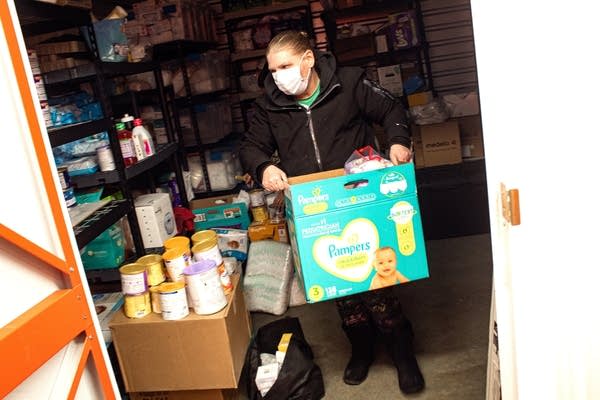Formula shortages stressing out some Minnesota parents

Go Deeper.
Create an account or log in to save stories.
Like this?
Thanks for liking this story! We have added it to a list of your favorite stories.
A steady stream of cars lined up outside of a U-Haul center in downtown Mankato on a cold Sunday afternoon as volunteers handed out infant formula, diapers and baby wipes to waiting parents.
Carter Gilbertson, 24, of Arlington, Minn., drove nearly 40 minutes with a friend. He heard about the distribution event while in town and stopped by to see if there was a specific infant formula for his son that’s been hard to find on grocery shelves lately.
“Our son is kind of sensitive, so some of the stuff that’s more readily available can cause him to have rashes and stuff like that on sensitive skin,” Gilbertson said. “So it’s nice to be able to get some stuff that you know might be harder to find in the stores.”

Like many recent product shortages, this one also appears to be tied to pandemic-related supply chain problems. The formula shortages are not widespread, but they can mean multiple trips to stores for parents, said Stacey Tabor, director of Feeding Every Baby. The nonprofit sponsored the Mankato distribution event, which was open to families regardless of income status.
Turn Up Your Support
MPR News helps you turn down the noise and build shared understanding. Turn up your support for this public resource and keep trusted journalism accessible to all.
“They used to be able to walk into the store and get any formula that they want,” Tabor said of the clients she has helped lately. “And then, after like the second or third try or trying online or running out before it’s shipped to them, we’ve seen an influx of people that needed it.”

Last month, Tabor put out a plea on social media after a spike in demand for donated infant formula and diapers nearly emptied out her storage unit.
“My greatest fear is that we have people that stockpile and panic buy, and then I actually need [the formula] now to give to people that need it now,” she said.
While the community responded to her plea with more items and donations of money, Tabor said she is still worried about her ability to help families if the shortages continue. She said she doesn’t have a lot of options if donations don’t keep coming through.
“The hardest part is saying no,” she said. “Saying, ‘I’m sorry, I can’t help you this time,’ or, ‘I don’t have that.’’’

Parents in other parts of the state are also struggling to find infant formula. Daniel Hogshead of Roseville, Minn., is foster parent to an infant. He said he often drives to multiple stores to search for formulas that are authorized for reimbursement by the federal Women, Infants and Children (WIC) program.
The search, he said, makes him anxious because it’s so necessary to have formula on hand for feedings.
“You know, when you go to the grocery store, and it’s just not there, and there doesn’t even seem to be a prospect of it being there,” Hogshead said. “I asked a manager at Cub Foods. I was like, ‘Do you know when you’re going to have formula in? Should I come back tomorrow?’ And [the response was] ‘No idea.’”
When he can’t find the formula he needs, Hogshead said he pays for other brands out of pocket. But, that can add hundreds of dollars to his monthly food bill.
“The brand that we use it’s like $18, and we’re authorized for seven cans in a month,” he said. “That’s about $125, $130 a month? So it’s quite expensive.”

While the shortages are spotty across the state, that doesn’t make it any less stressful for the families who are affected, said Kate Franken, director of the state WIC program.
“When it’s your own family and your own infant, it feels like a crisis,” Franken said. "We are worried about it. We’re trying to do everything that we can and ensure that that infant, that family gets access to the nutrition that they need."
Franken said families enrolled in the program should contact their local WIC clinics for help in troubleshooting their individual situations.
For other parents who are struggling to find formula or other essential baby supplies, nonprofits like Feeding Every Baby continue to provide what they can.
Ariel Bath of North Mankato, Minn., said she’s grateful for the help because she doesn't have a close support system. The mother of three daughters all under the age of five recently quit her full-time job to care for her fiancé, who was diagnosed with cancer. She now has a part-time job.
With three daughters, Bath said she goes through a lot of diapers.
“I hate asking for help, I truly do,” Bath said. “I mean, it feels like a burden on someone, ‘Oh, hey, you know, I’m needing a pack of diapers,’ or ‘I’m needing formula for my child.’ It’s super hard and kind of embarrassing, to be honest with you, to ask for that help. But at the same time, you’re trying to do what’s best for your child.”

Dear reader,
Political debates with family or friends can get heated. But what if there was a way to handle them better?
You can learn how to have civil political conversations with our new e-book!
Download our free e-book, Talking Sense: Have Hard Political Conversations, Better, and learn how to talk without the tension.



